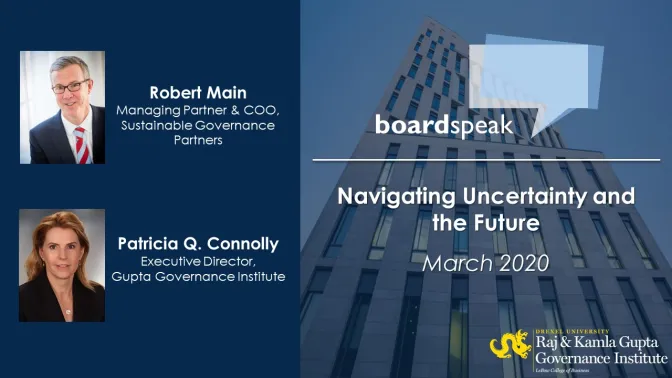
Governance Guides Success: Glenn Booraem, Gupta Governance Institute Industry Chair

Glenn Booraem is a Principal at Vanguard and serves as a Senior Advisor to Vanguard’s Investment Stewardship team. He supports the investment stewardship efforts, including proxy voting and corporate engagement, on behalf of Vanguard’s index funds with thousands of companies across the globe.
Booraem currently serves on the board of the Philadelphia Chapter of the National Association of Corporate Directors (NACD); he has also been named to the NACD’s Directorship 100 as one of the most influential governance professionals “in and around the boardroom” for more than 10 years, most recently in 2023. Glenn also serves on the Vickie and Jack Farber Institute for Neuroscience Campaign Committee at Jefferson Health.
Booraem leverages his experience on the front line of corporate governance in his role as Industry Chair of the Raj and Kamla Gupta Governance Institute (GGI) at Drexel University’s LeBow College of Business.
GGI Facilitates Dialogue
Booraem has been an active participant in the activities of the Institute, as well as its predecessor organizations at Drexel, including its signature Directors Dialogue and Academic Conference for many years. Each of these stepping stones is a key milestone in the Institute’s evolution and forms the foundation for future growth.
“Many of the areas in which we’ve seen directional progress in the market, from better disclosure to more deliberate engagement, were key areas of discussion in Directors Dialogue years ago. Seeing them materialize ‘in the wild’ takes those discussions full circle,” said Booraem. “When Dean Vibhas Madan, Drexel’s Lebow College of Business, approached me about joining the Institute and continuing to contribute to the Institute’s work to advance leading governance practices – spanning both the corporate and non-profit worlds – it was a no-brainer for me.”
Under the leadership of its new Executive Director Lisa Woods and with the support of Raj and Kamla Gupta and its Advisory Board, Booraem believes the Institute is well-positioned to make a difference by contributing to effective governance by leveraging the intersection of practitioners and academics in a rapidly changing environment.
In the context of this rapid pace of change, there is no silver bullet or “one-size-fits-all” solution to every governance question, especially given the idiosyncrasy of each organization in the corporate and non-profit sectors. The Institute can facilitate discussions among practitioners, explore symbiotic relationships on a cross-functional basis, and supplement that with impactful academic research. Booraem quotes the words of former Vanguard CEO Jack Brennan , who was an active participant in the earliest Director Dialogue, “We can leave the woodpile higher than we found it. And that’s a good thing.”
Inflection Points Matter
Booraem’s entry into the governance ecosystem in the early 2000s coincided with one of many disruption-driven inflection points that have resulted in the reestablishment of regulatory requirements and stakeholder expectations. In this case, U.S. markets were emerging from the burst of the dot-com bubble and governance implosions at companies including Enron and Worldcom. This was followed by legislative and regulatory intervention in the form of the Sarbanes-Oxley Act of 2002 and the adoption of conforming rules by the Securities and Exchange Commission (SEC), coupled with tougher listing standards by U.S. stock exchanges.
Shortly after the passage of Sarbanes-Oxley, the SEC adopted rules requiring the disclosure of proxy votes by mutual funds – including those managed by Vanguard – beginning in 2004. In the two decades since this convergence of regulation of both public companies and the asset managers that hold positions in those companies on their clients’ behalf, there has been rapid evolution in governance practices for which Booraem has had a front-row seat.
There has been substantial evolution over the course of this 20+ year journey – with the Global Financial Crisis and the subsequent passage of Dodd-Frank and ensuing regulation serving as yet another inflection point. The core of an organization’s governance has been and remains its board of directors who collectively serve as the eyes, ears, and voice of an often widely dispersed set of stakeholders or beneficiaries. To this end, it is critical that those who serve in this capacity are “fit for purpose” with the right complement of skills, experience, and characteristics for the organization at which they serve at particular moments in its evolution.
Although corporate boards’ fiduciary obligations as shareholders’ agents are well-established, they continue to be pressure-tested under corporate law. The public spotlight under which they operate shines ever brighter and the expectations of many stakeholders continue to rise and expand.
Booraem points out two thematic and symbiotic dimensions of the governance ecosystem that continue to unfold are transparency and engagement. Taken together, these channels support a more continuous dialogue – if necessary – as opposed to the episodic, point-in-time opportunity presented by the annual meeting ballot.
Mass Communication and Disclosure
Whether driven by regulatory mandates or iterative best practices, there is increasing clarity and transparency of corporate practices and outcomes across multiple dimensions. While practices still vary significantly – especially when not mandated by regulation or listing standards – foundationally important matters such as the composition of corporate boards, including the skills and characteristics of their members, provide more insight than ever into the operation of the governing body that serves on shareholders’ behalf. Similarly, while underpinned by mandatory disclosure (whose requirements continue to expand), more and more companies are providing more transparent and informative narratives covering areas that are material to investors, including executive compensation and their oversight and mitigation of material financial risks.
At the same time, investment managers who serve as fiduciaries for their end investors continue to provide increasingly expansive reporting regarding their governance efforts, including their proxy voting policies and decisions. Though some of this has been required since 2004 (and has been expanded marginally), many firms, including Vanguard, have continued to expand their communication and disclosure efforts in this space to better inform a range of interested stakeholders.
Engagement
In parallel with the expanded disclosure and other mass communications by companies and asset managers, there has been a substantial uptick in direct dialogue between company management/board members with their largest investors and other stakeholders. From a relative standing start in the years prior to the Global Financial Crisis, this dialogue – often referred to as “engagement” by practitioners – has become a significant component of the company/shareholder relationship.
For example, Vanguard says in its most recent public reporting that it had such discussions with more than 1,300 companies globally in 2022. Similarly, more companies are including information in their disclosure summarizing what proportion of their shareholder base they have engaged with, what feedback they may have received, and what they’ve done in response. This serves as a valuable supplement to the shareholder voting process in that it enables (a) a more nuanced discussion of items on the shareholder ballot beyond the binary for/against voting options, and (b) a discussion of matters that may not be on the ballot yet - but may be of interest to shareholders.



